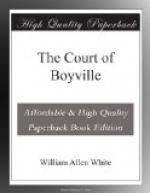In an instant the boy’s eyes filled with tears. They dried in anger before they reached his flushed cheek. He clinched his hands, turned, and walked hotly out of the room. In the door he paused, whirled around, and cried,—
“Yank! Yank! Rick-stick-stank!
High ball, low ball, dirty-faced Yank!”
[Illustration: During the next two hours the boy wandered on the prairie.]
Then he ran wildly down the street to escape the infuriated mob which he believed would pursue him. The knowledge that he was cut off from the day’s festivities made him wince with pain as he ran. Not until he came out upon the road across the prairie did he stop—breathless, worn out, crying. During the next two hours the boy wandered on the prairie and in the woods gathering wild flowers. By the time the exercises in the Willow Creek opera house were finished and the procession was formed, Bud Perkins had a heaping armful of field blossoms. He was coming over the hill to the cemetery when he heard the band strike up the “Dead March” down in the village. His impulse was to run away. He checked himself and walked across the place, past the shafts and monuments, toward his father’s grave under the hill furthest from the town. In the middle of the cemetery the boy stopped. His eyes were caught by a marble lamb over a child’s grave. The inscription he read was “Mary Pennington, aged two years, three months, and ten days.” The date line upon the stone, told of a year that had passed before the Perkins boy was born. He gazed at it a moment, and put there a handful of his choicest flowers. Looking up he saw some early visitor to the silent place stepping from behind a monument. Bud had scattered his flowers before he saw that he was being watched; so he pretended to hunt for stones to throw. He gathered several, and peppered them at shafts and at birds.
[Illustration: “Mary Pennington, aged two years, three months, and ten days”]
Bud Perkins walked to the freshly-made mound where his father lay, and scattered his posies over it. The village “cornet band” was coming nearer and nearer to the hill. The boy curbed a temptation to leave. He walked lazily about the grave until the Memorial Day procession had entered the big iron gate a hundred yards away. Calhoun Perkins’s grave could not be seen from the plot where the townspeople had gathered. The boy sat down with his back to the crowd. He did not know how near the people were to him. He felt that they were staring down, perhaps laughing, at him. So he tried to assume a careless air. He picked up clods and tossed them at adjacent objects. Tiring of this, he chewed the grass stems, and sucked the nectar from the corolla of wild honeysuckles. But this did not keep the lump out of his throat, and it did not subdue the turmoil of sorrow in his heart at the thought that his father was scorned in the town. Once his small frame shook with a strangled sob, but immediately afterward he threw an unusually big clod at a post near by. He had been hearing voices and footsteps on the brow of the hill for several minutes. Occasionally he picked out a familiar voice, and once he heard Mealy Jones call his name. He did not answer, but a woman standing a little further up the hill asked Mealy, “Who is it, Harold?” “Bud,” said the youngster.




